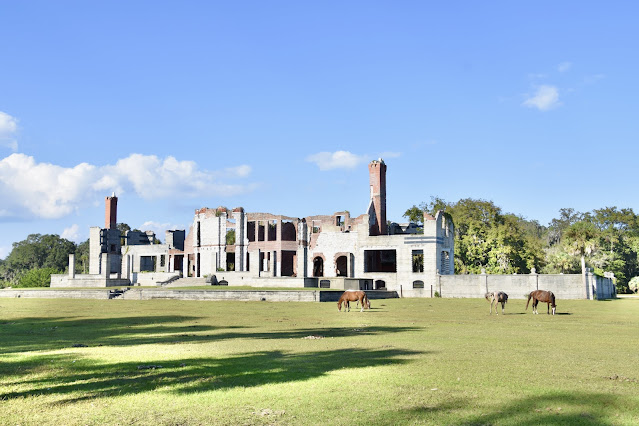Update on the Cumberland Island Wild Horses
It's been nearly ten months since the lawsuit against the National Park Service (NPS) began, which subsequently kicked off my campaign to save Cumberland Island's Wild Horses. I launched a petition in April, which now has 1,800+ signatures. I began visiting the island regularly and recently released a document on my observations and research there. Visiting Cumberland Island gave me a fun opportunity to film episodes, which I've posted on Mustang Mission's Patreon! I continue to learn so much about the horses and the beautiful island they inhabit.
Over the past several months, I have communicated with the NPS. Currently, they cannot discuss the horses due to the litigation, but have been open to hearing about my research.
I have also sent my research to the person over the lawsuit and asked if we could discuss the horses again (we had a long conversation in spring). I was told that there was no interest in speaking to me.
One of the projects I've been working on is photographing the wild horses and adding them to an identification database. This is helpful as I'll be able to keep track of the horses I've seen and recognize them in upcoming trips. Right now, there are about sixty Cumberland Island Horses in the database.
The first court meeting of the lawsuit was held in early December. In that meeting, the U.S. Department of the Interior, National Park Service authorities, and two Georgia commissioners told a state federal judge that this lawsuit must be thrown out. They said that the lawsuit points to no legal authority requiring them to remove or manage the horses.
The plaintiffs are arguing that these horses are "livestock" and, as such, are "owned" by Georgia. In Georgia, livestock owners cannot allow their livestock to "run at large or to stray upon" property that doesn't belong to the owner. They are placing the horses under the Human Care for Equines Act and stating that the state is in charge of them. This is an interesting argument as Cumberland Island is owned by the government, and if Georgia (the government) owns the horses, they are running on their own land.
The Georgia officials pointed out that these horses, while once domestic, have now reverted to a wild state. Being wild, they have no owner, as the attorney argued.
The plaintiffs also accused the government of allowing the horses to trample sea turtle and shorebird nests. Cumberland Island has one of the healthiest populations of birds and consistently has the largest number of sea turtle nests out of any other beach in Georgia. During my visits to Cumberland, I have seen that there is much trash littered throughout the dunes. It may also be humans' fault that these nests are trampled, not just the horses'.
The plaintiffs consistently claimed that the horses suffer and live in less than humane conditions, lacking veterinary or humane care. However, wildlife (which these horses are) are not expected to receive veterinary care. The deer, squirrels, and bobcats on Cumberland do not receive veterinary care - what makes the horses different?
Hearing these arguments is frustrating, knowing that the horses could be thriving right now with minimal management - just mineral intervention.
Right now, there are just a few ways you can take action for the Cumberland Horses. I've listed them below. Be sure that you are subscribed to our email newsletter to be notified of new ways to take action when they arise.
- Please pray that the lawsuit does not succeed and ends soon!
- Sign and/or share the petition>>
- Get educated (read my research and observations).
- Purchase a t-shirt to help fund the expenses involved!
- If you live on Cumberland Island or locally on the mainland, we could use your help! Please contact me at mustangmissionrescue@gmail.com.
Thank you for making a difference for the Cumberland Horses! Your help and support is invaluable and greatly appreciated!








The wild horses on Shackleford Banks, NC are protected and watched over by the NPS as well as the Foundation for Shackleford Horses. A bill was passed by Senator Walter B. Jones many years ago. I don't know why your representatives in congress would not be behind you. These horses have to be a draw for tourist which brings in money for the state. NC owns Carrot Is. in Beaufort, NC and the wild horses there are also protected and watched over. Vet care is brought in when needed, but they do not give the horses "regular" vet care such as vaccines, etc. You should contact your congressmen/women.
ReplyDeleteThat's definitely something I'm planning on doing! The current litigation makes everything more difficult...🙄
DeleteI'm actually friends with the lady that started the Corolla Wild Horse Fund. I've gotten lots of good ideas from her!
This reminds me of feral cat management in Philadelphia where I live.
ReplyDeleteHere the local government, ACCT which stands for Animal Care Control Team and most residents support the TNR program. Cats here have roaming rights and spay neuter is free. Winters can be harsh though and the occasional drought as well. I still think cats may be better able to handle homelessness and fending for themselves although people are encouraged to provide food, water, shelter and veterinary care as needed to make their lives easier. It sounds like for all Cumberland Islands beauty and resources fresh water is missing and food along with selenium as well as emergency veterinary care. I’ve read also that some of the horses have sunburns.
I was thinking about relocating to Saint Mary’s but the thought of horses suffering is a total turnoff!